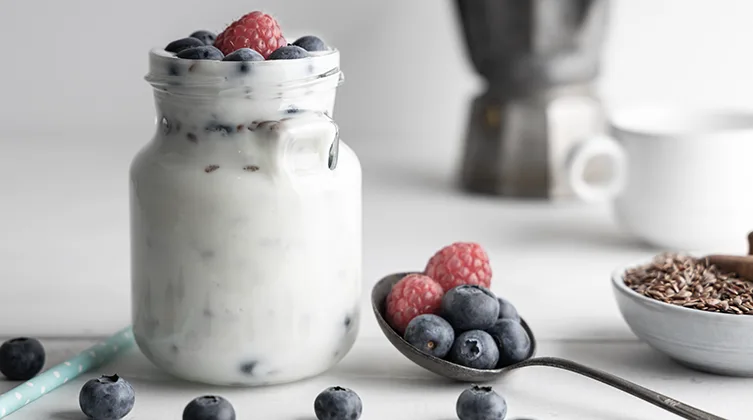Yoghurt can be a nutritious, delicious component of the diet and a great source of beneficial probiotics. However, the range of yoghurts available on the supermarket shelves is overwhelming and many (even most) fall short when it comes to health. So, how do you choose the best yoghurt for health?
(Note: this article concerns traditional, dairy yoghurt and does not discuss plant-derived versions.)
WHAT IS YOGHURT?
To appreciate and choose good food, it is helpful to understand how it is made and where it comes from. Yoghurt is made by combining bacteria and milk, and warming the mixture to an ideal temperature that encourages bacterial fermentation. Fermenting bacteria extract the sugar, called lactose, from the milk and convert it into lactic acid. Lactic acid gives yoghurt its distinct, tangy flavour. It is this process that changes the chemical composition of milk, causing it to thicken and create yoghurt.
The bacteria added to the milk are called starter cultures. The most common starter cultures used in the production of yoghurt are L. Bulgaricus and S. Thermophilus. Additional probiotic bacteria are sometimes added to yoghurts to give them an extra nutritional boost, which are associated with better health outcomes. The strains you tend to see added include L. Acidophilus, L.Casei and Bifidobacterium.
THE SWEET STORY
Yoghurt naturally contains some sugar i.e. lactose from the milk. While most of this lactose is acted upon by the fermenting bacteria, it is futile to seek out a sugar-free yoghurt. Instead strive to obtain a yoghurt with no or minimally added, additional sugar.
If you find natural or Greek yoghurt too bland or “sour” consider adding your own natural sweeteners such as raw honey, fruit (fresh or frozen) or try cinnamon, coconut, oats, vanilla, almond butter or some homemade granola.
HOW TO MAKE A NUTRITIOUS CHOICE
To sidestep the extra sugar and unnecessary additives, the following pointers may be helpful with choosing a healthy yoghurt:
- Less than 6g sugar per 100g
- Choose natural – no added fruits, flavourings, or sweeteners
- Go organic, where feasible
- Make sure it contains probiotics (live cultures) – more is better
- Full-fat/low-fat, choose the one you enjoy!
- Keep the ingredients list short – milk + live cultures. Avoid the extras such as inulin, milk solids, added sugar and artificial additives.
THE BEST OF THE BUNCH IN AUSTRALIA:
Meredith Goat or Sheep Milk Yoghurt: this would have to be my favourite. It’s a great alternative to cow dairy and easier to digest.
Jalna: a beautifully pot-set yoghurt.
Five:am: a smooth tasting, natural yoghurt with no additives.
Barambah Organics: made with non-homogenised milk, this yoghurt is rich and creamy.
Chobani plain: the strong flavour may deter some people, but this is another great option.
CONSIDERING KEFIR
Kefir is relatively difficult to come by. It’s not commonly sold in the supermarkets here in Australia, but it is readily available from health food stores. Kefir is a fermented milk product, like yoghurt. However, it uses different starter cultures, such as L. Caucasus, Leuconostoc, Acetobacter species, and Streptococcus species, as well as some beneficial yeasts. It also involves adding kefir grains to the milk. Kefir is arguably a better source of probiotics compared with traditional yoghurt. This is because of its powerful probiotic combination and its greater potency.
Do you have a favourite yoghurt that ticks all of the boxes as a nutritious choice? Share your recommendations by letting me know where in the world you live and what brand you love. I’m always on the lookout good local products, especially when I’m travelling.





